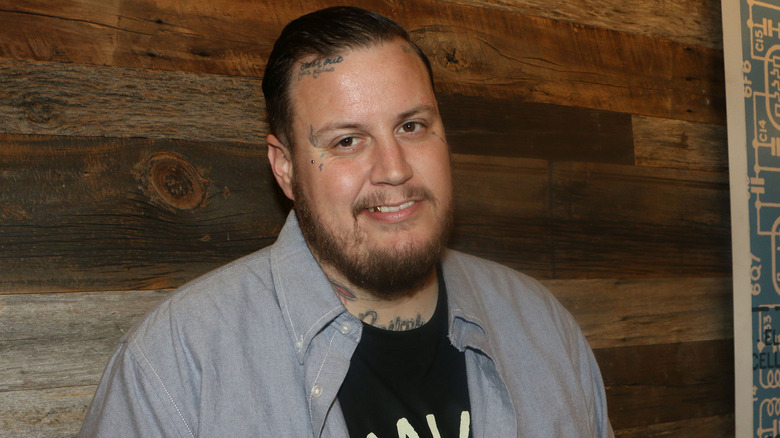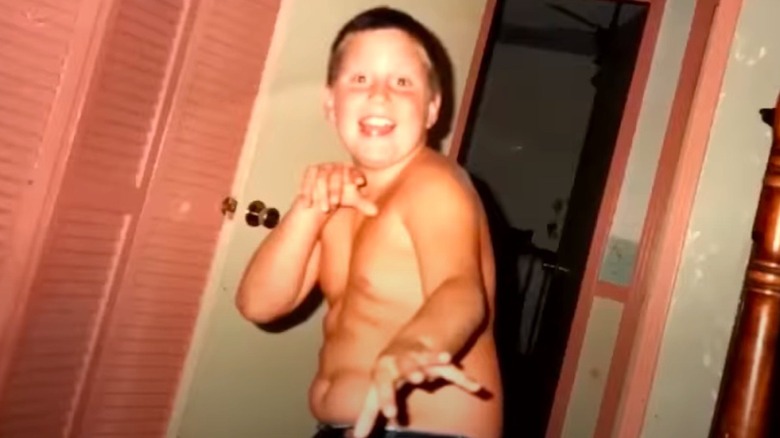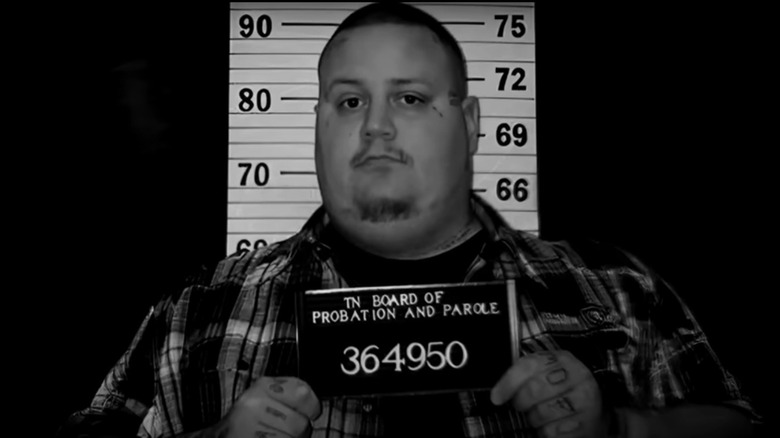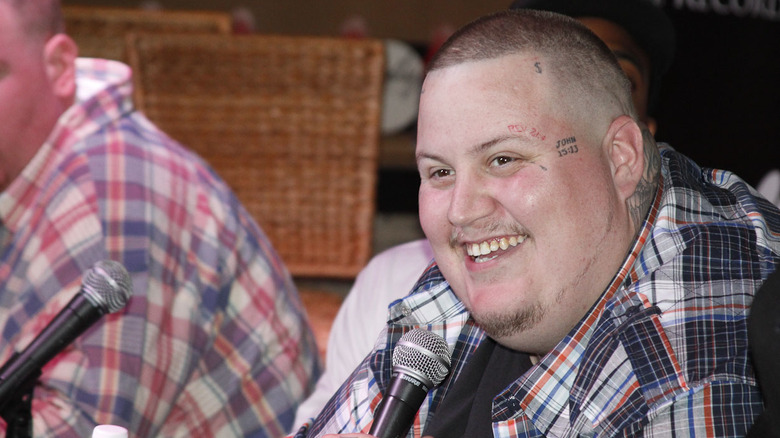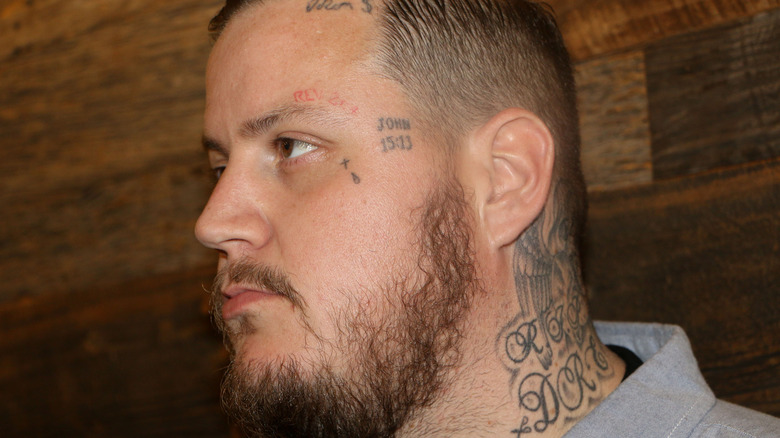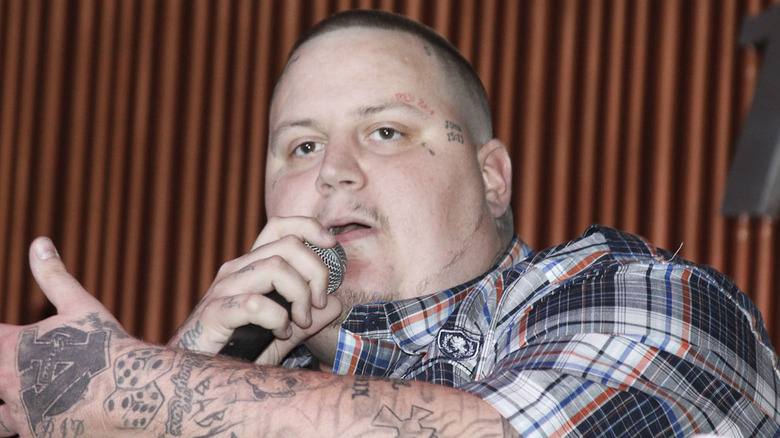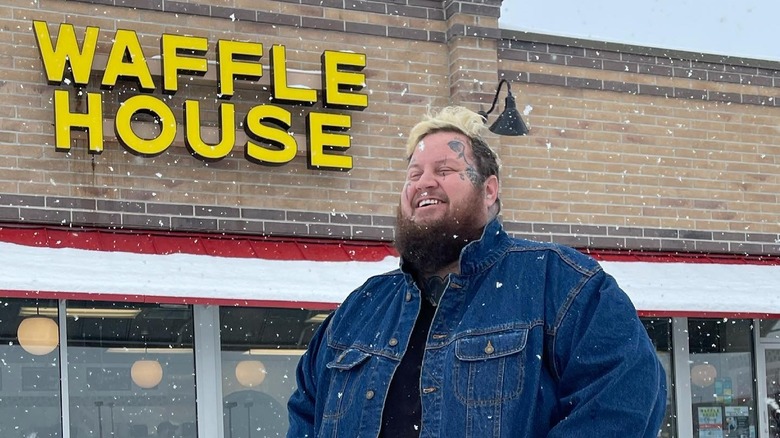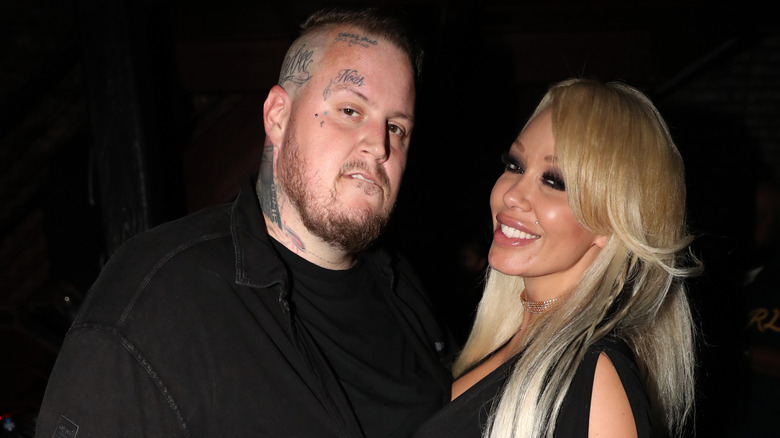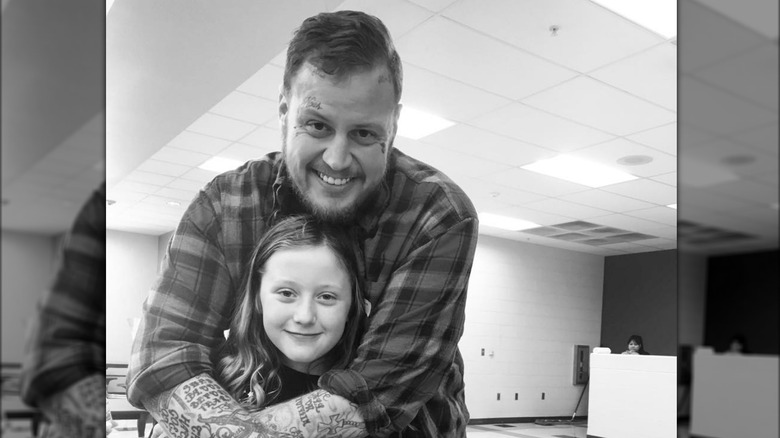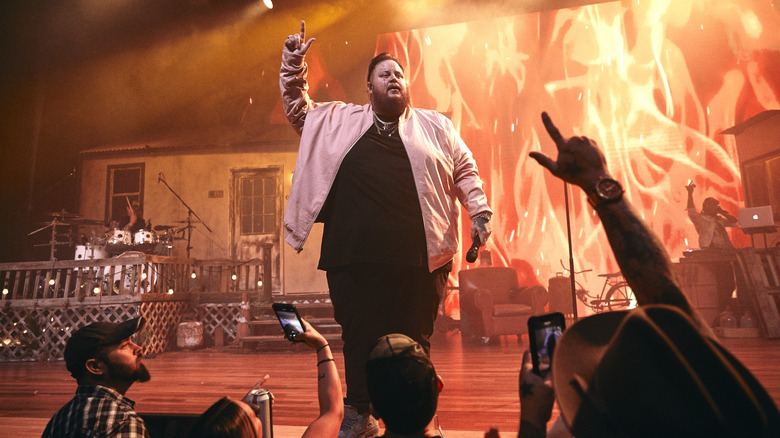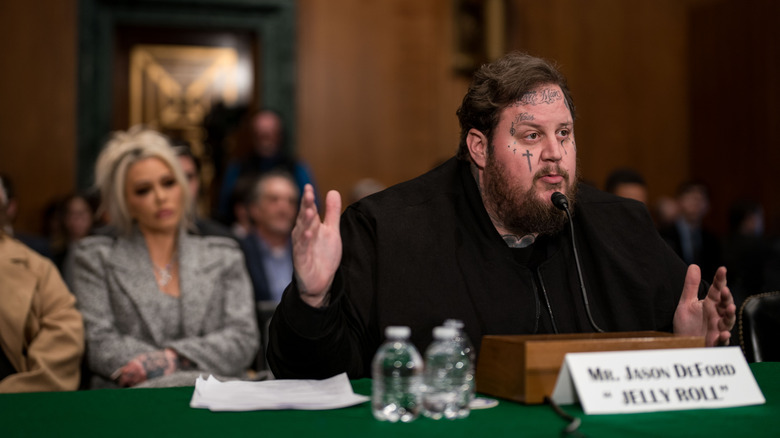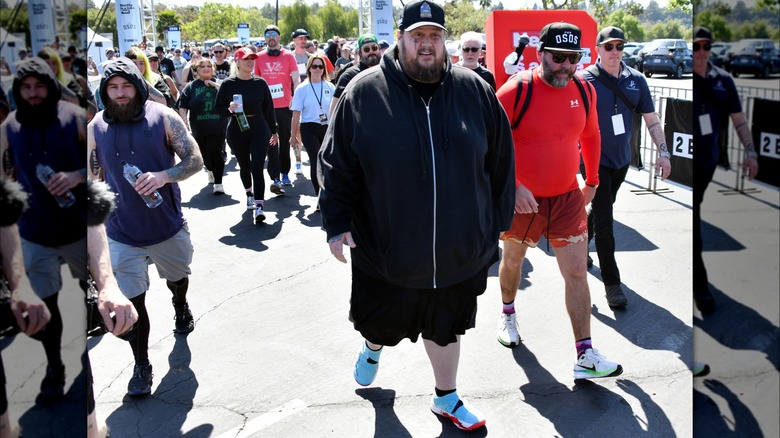Jelly Roll's Complete Transformation
The following article contains references to drug use.
There are few music artists within recent years to have exploded in the public consciousness so quickly and so profoundly as Jelly Roll. It wasn't that long ago, in fact, that he was a struggling rapper playing small gigs that paid so little that he lived out of the van he drove from town to town.
He didn't have the backing of a major label, but what he did have was an innate ability to connect with listeners on a deeply emotional level. "When I first started music they told me I didn't have a chance," he wrote in a 2020 Facebook post. "They said my voice wasn't cool enough. They said I wasn't marketable. ... They said I was too fat and too trashy." In that post, he revealed that he then had 1.3 million listeners on Spotify each month, while another 1.1 million subscribed to his YouTube channel — a remarkable achievement for an independent artist without a big label's machine behind him.
You'd better believe those labels began calling, and he ultimately signed with one. Since then, he's released two hit albums and several popular singles, taken home shelves full of music-industry awards, and watched his Spotify numbers soar through the roof (as of this writing, he boasts nearly 13 million monthly listeners). There's no question that he's had a meteoric rise to the top, and it's only just begun. This is how he got here.
Jelly Roll's childhood was no picnic
Jelly Roll was born Jason Bradley DeFord in the Antioch area of Nashville, Tennessee. Jelly Roll is not a name he adopted upon becoming famous — his mother bestowed the nickname on him when he was young and it stuck. His father, Horace "Buddy" DeFord, worked for a wholesale meat business, but also pulled together some extra cash by moonlighting as a bookie, taking bets for an illegal gambling operation. From as early as he can remember, his mother battled addiction while also coping with mental health issues. While that would seem to be an atypical childhood for many, for Jelly Roll it was just the way it was. "I knew my father booked bets. I knew my mother struggled with drugs," he explained in an interview with "CBS Sunday Morning." "So, to me, this was just what you did."
Jelly Roll grew up poor and by the time he entered his teen years, he began gravitating toward petty crime. In fact, he's the first to admit that he was a handful for his parents and caused them no end of grief over the course of his adolescence. "Many times the police knocked on my mother's door looking for me, many nights she went to sleep worried the phone would ring in the middle of the night and something would've happened bad, many nights she prayed and worried if I would ever get my life together," he wrote in a Facebook post.
He spent his youth in and out of prison
Dabbling in various criminal enterprises eventually caught up with Jelly Roll. He was arrested for the first time at 14, and it wouldn't be his last. Over the next decade or so, he became familiar with incarceration, first in juvenile detention centers before graduating to full-fledged prison. The charges varied, ranging from drugs (possessing with the intent to sell), shoplifting, and robbery. "There was a time in my life where I truly thought ... this was it," he told "CBS Sunday Morning" of what he saw as the inevitability of remaining behind bars.
His brushes with the law took a darkly serious turn when he was charged with aggravated assault at the age of 16. Because of the severity of the incident, he was charged as an adult, not a juvenile — and he faced a potential sentence of 20 years. "They were talking about giving me more time than I'd been alive," he recalled in a 2023 interview with Billboard. "I was charged as an adult years before I could buy a beer, lease an apartment, get a pack of cigarettes."
He was sentenced to eight years behind bars but wound up serving just over a year. He spent the next seven years on probation and wound up returning to prison several times in the years that followed. "I feel like the justice system at that point kind of parked me on my only set path," he reflected.
If you or anyone you know needs help with addiction issues, help is available. Visit the Substance Abuse and Mental Health Services Administration website or contact SAMHSA's National Helpline at 1-800-662-HELP (4357).
Becoming a father set his life on a different path
It was during an incarceration for drugs in 2008 that a guard knocked on Jelly Roll's cell door to deliver some news. "He said, 'DeFord, you had a kid today.' I said, 'What?' He said, 'Yeah, yeah, you had a child.' And I was like, 'What's her name?' And he said, 'Hell, I don't know,'" he recalled for "CBS Sunday Morning."
As he told People, he's come to see that one moment as when everything changed for him, forcing him to confront the realization that he was a father with a responsibility to get his life back on track — and fast. "I compare it to the Christian scripture of when Saul turned into Paul on the Damascus Road," he said. "It was kind of that moment for me."
With some hard time left to serve, Jelly Roll began to use his time productively. He began by studying for his GED, an attempt to make up for all the school that he'd skipped; he passed on his first attempt. Recalling that period in an interview with The Guardian, he promised himself he would do "whatever it took not to go to jail or get shot and killed." He gave himself two options: study to become a social worker or focus on the music he'd been making since his teenage years. He chose music.
He confronted his long history of substance abuse
After his release from prison, Jelly Roll was finally able to see his daughter, Bailee Ann, meeting her for first time when he attended a party celebrating her second birthday. "I grilled hamburgers and hot dogs," he told Billboard.
Committed to being a part of his daughter's life, he realized there was another aspect of his life he needed to confront: drugs. To be fair, Jelly Roll is hardly someone who'd be described as sober — he's been candid about his continued use of marijuana and alcohol, but he realized he needed to put the harder stuff behind him. "I had to get rid of the lean [codeine-laced drink], the pills, the cocaine," he told The Guardian. "I didn't have a choice. It was me or them, and I had to learn to love myself."
Jelly Roll is cognizant that his particular brand of quasi-sobriety certainly isn't for everyone, but he insists that it has worked for him. "I walk the line when I talk about my recovery out of respect for the people that have actually worked the [program] and completely sobered up," he explained. That said, he's experienced the depths of addiction, and the harrowing songs he's written about the subject have connected with people who, like him, have lost loved ones because of it. "Somebody save me, me from myself," he sang in his single "Save Me." "I've spent so long livin' in hell."
He began making a mark in rap music
Ever since childhood, Jelly Roll had been a fan of rap music. "The culture I was first exposed to was hip-hop," he told Billboard. "Not even just music, but the culture — breakdancing, graffiti, freestyling, the clothing." As he immersed himself in Nashville's burgeoning rap scene, he began creating his own music. As he grew more confident in his rap skills, he took his songs into a recording studio, and emerged with CDs that he'd hand out to his customers while dealing drugs. "I'm just like, 'Yo, here's a sack of weed. Here's a gram of coke. Here's a mixtape.' Know what I'm saying? 'I rap, too!' It was like my business card," he explained while speaking with "CBS Sunday Morning." "Even my drug dealing, to me, was always a means to music."
He experienced his first brush with success in 2010, when his rap single "Pop Another Pill" became a modest hit. For the next decade he would pursue a rap career, slogging away in small clubs while slowly building an ever-increasing following.
As his popularity grew and he made a gradual shift from rap to country, he continued to meet resistance from the powers that be among the country music establishment. "[I was told] nobody's gonna buy a 400-pound man singing sad songs," he told The Guardian. "Like, it's just not in the bingo card for what the climate of music is."
He nearly got sued by Waffle House
Jelly Roll was still in the up-and-coming phase of his rap career when he unveiled his 2013 album, "Whiskey, Weed & Waffle House." The cover art offered a literal depiction of the title, featuring a marijuana leaf, a bottle of Crown Royal whiskey, and the logo for the Waffle House restaurant chain.
His new musical offering quickly attracted attention — but not exactly the kind he'd expected. That became clear when he received a letter from a Waffle House attorney who threatened to sue him for using the restaurant's logo without permission. "When I first got the cease and desist letter I thought somebody was pulling my chain," he explained (via HipHopDX). "I thought, 'Surely I'm not known enough for Waffle House to give a s*** about me using their name." Jelly Roll responded by immediately altering the cover of the mixtape, ditching the offending logo and changing the title to "Whiskey, Weed & Women."
In 2021, he took to Instagram to reveal that he'd since come to realize that Waffle House's threat of a lawsuit provided him loads of free publicity. As he recalled, the legal skirmish warranted a major feature on the Gawker website and even became a monologue joke on "The Tonight Show Starring Jimmy Fallon." "Long story short my fat a** holds no grudges ," he wrote, adding that he's remained a loyal Waffle House customer. "I still come by one anytime I'm drunk or hungover," he added.
He met the love of his life in Bunnie Xo
Jelly Roll was performing in Las Vegas in 2015 when he met his future wife, Bunnie Xo. Their road to romance was a rocky one, given that he was so broke that he couldn't afford hotel rooms when he was on tour, instead sleeping in his van. Additionally, Bunnie was an escort who had a boyfriend at the time.
Once Bunnie ditched that boyfriend, the two began dating. One night in 2016, she was watching him perform at a Vegas club when he surprised her with an impetuous marriage proposal. She agreed to be his wife, and, given they were in an area literally surrounded by wedding chapels, they figured there was no point in having a long engagement. "I'm like, 'F*** it, let's just go now.' She's like, 'The courthouse is open for like ... 44 more minutes," he recalled in a TikTok video.
The marriage has endured, and in 2023 they renewed their vows at the same Vegas chapel where they got hitched. This time, Bunnie was decked out in a stunning white gown. Jelly Roll commemorated their second wedding in a video shared on TikTok with the caption, "7 years ago we stumbled into this little chapel in Vegas black out drunk," he wrote. "My only regret was never seeing her in a dress."
He got his life together and gained custody of his daughter — with Bunnie Xo's help
In 2016, Jelly Roll was awarded custody of daughter Bailee Ann, the culmination of a long process that had begun even before he became involved with his wife, Bunnie Xo. Appearing on the "Bussin' with the Boys" podcast, he recalled a difficult conversation early in their relationship. "I have to sit Bunnie down and go, 'Look, I have a kid that you know about that I'm fixing to have to get full custody of,'" he said. "'There's also a woman out there that's pregnant with a kid of mine.' Bunnie is just like, 'Whew, man, that's a lot.' She was like, 'But I got you.'"
One big hurdle in winning custody of his daughter was his status as a flat-broke ex-con, and Jelly Roll credits Bunnie for playing an instrumental role in overcoming those particular obstacles. As he explained, she got them a home that included a room for Bailee Ann and paid for a lawyer — even though she wasn't sure where their relationship was headed. "She said, 'No matter what happens with us, I'm gonna help you get this little girl," Jelly Roll recalled while choking back tears. "Bunnie bankrolled the whole s***, and she never talks about that," he added.
Jelly Roll's daughter, Bailee Ann, shared her thoughts in a 2022 Instagram post. "In 2016 my life changed forever, for the better," she wrote. "My dad got custody of me, and so did his wife."
He landed a No. 1 single and cemented his stardom
The latter half of the 2010s proved to be a make-or-break period for Jelly Roll as he continued to build his fanbase, show by show, while evolving from hip-hop to country. It paid off in 2020 when he posted a music video for an acoustic ballad, "Save Me," which announced the new sound he'd been crafting. When the video began racking up views (230 million and counting), it didn't take long for Nashville to take notice. "I saw that pain, vulnerability, that tenderness," Jon Loba, president of BMG Nashville told Billboard. "I loved his vocal. I just said, 'That's a country song.' I was convinced his storytelling, his heart, and his brand would be accepted by our genre."
Loba signed Jelly Roll to his label, and in September 2021 he released his first major-label album, "Ballads of the Broken," led by hit singles "Dead Man Walking," and "Son of a Sinner." "Dead Man Walking" gave Jelly Roll his first-ever No. 1 single on country radio, while "Son of a Sinner" proved to be a huge breakthrough with a slow build; in January 2023, the single topped the charts — 10 months after it had been released.
In February 2023, Jelly Roll set a record by spending 25 weeks in the top spot of Billboard's emerging artists chart. Weeks earlier, he'd sold out Nashville's Bridgestone Arena, leaving no doubt that he was a musical force to be reckoned with.
He shared his harrowing story while testifying at Capitol Hill
Perhaps the biggest theme permeating Jelly Roll's music is the stranglehold that addiction can take on someone's life — not surprising, given his own experiences with substance abuse, and what he's seen friends and family members go through.
All of that came into play in January 2024 when he travelled to Washington, D.C. to lobby for anti-fentanyl legislation before the Senate's Banking, Housing and Urban Affairs Committee. "I've attended more funerals than I care to share with y'all," he said in his speech, reported CNN. "I could sit here and cry for days about the caskets I've carried of people I love dearly, deeply, in my soul."
In his remarks, Jelly Roll encouraged the senators in attendance to pass the FEND Off Fentanyl Act, a bill that targeted money-laundering as a way to shut down fentanyl traffickers in Mexico and China, which in turn would hopefully lessen the epidemic of overdose deaths. He addressed his own criminal past, and the role that he played in getting drugs — including fentanyl — into people's hands during his drug-dealing days. "I was the uneducated man in the kitchen playing chemist with drugs I knew absolutely nothing about, just like these drug dealers are doing right now when they're mixing every drug on the market with fentanyl," he said. "And they're killing the people we love." Jelly Roll's efforts proved to be successful when, in April 2024, the bill was signed into law.
His weight-loss journey has been inspiring
During the first few months of 2024, Jelly Roll's fans began noticing that there was a little less of him to love. That was certainly evident on May 7, when he competed in the 2 Bears 5K, a marathon hosted by comedians Bert Kreischer and Tom Segura as part of the Netflix is a Joke comedy festival.
Interviewed by People after competing in his first-ever 5K, Jelly Roll revealed that he'd been training for the event, embarking on a diet-and-exercise regimen in preparation for the race. "I'm probably down 70-something pounds," he revealed. "I've been really kicking a**, man. I'm doing two to three miles a day, four to six days a week. I'm doing 20 to 30 minutes in the sauna, six minutes in a cold plunge every day. I'm eating healthy right now."
Having weighed in at over 500 pounds at one point, he felt he'd made some significant progress but conceded that he still had a long road ahead of him. "I was thinking, I plan on losing another 100, 100-and-something [pounds]," he said of his ultimate goal, gushing about how great he'd been feeling since he began his weight loss journey. "If I feel this good down this weight, man, I can only imagine what I'm going to feel like by the time I go on tour," he said.
